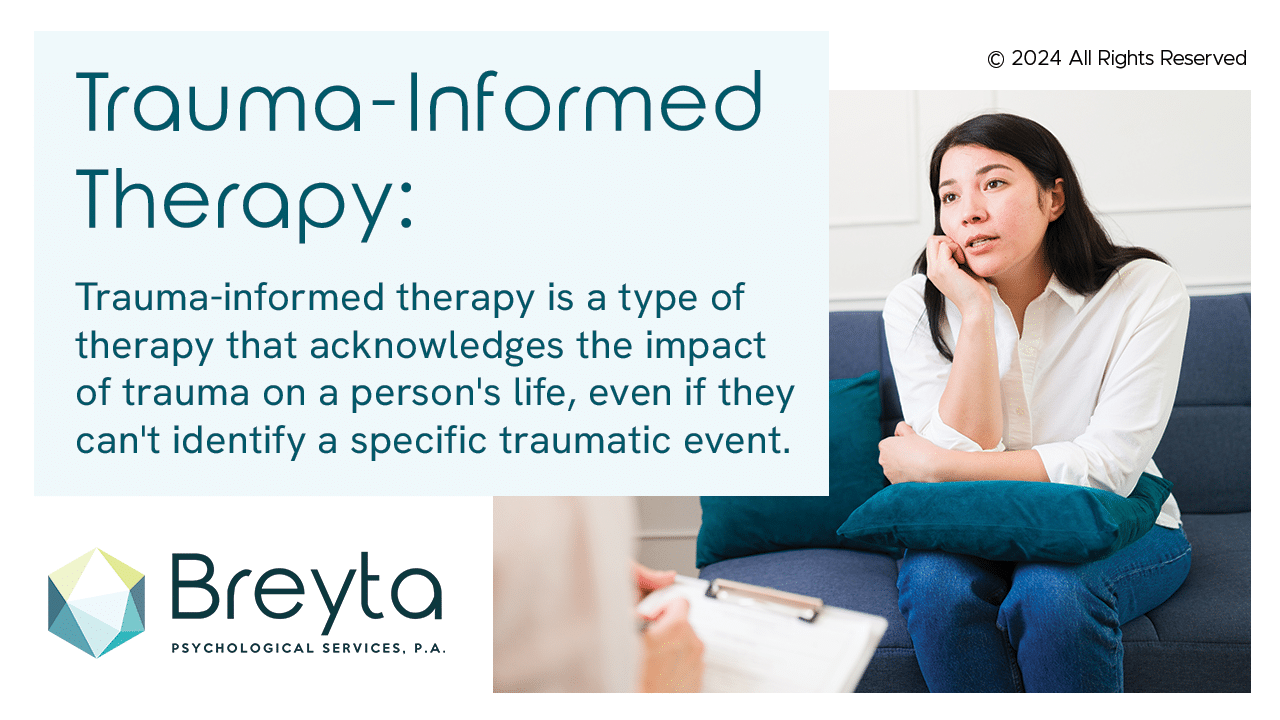Have you ever felt like your past experiences hold you back from living your best life? You’re not alone. Many people struggle with the effects of trauma, even if they don’t realize it.
Trauma-informed therapy can be a powerful tool for healing and moving forward.
This blog post will answer your questions about trauma-informed therapy:
- What is it?
- How is it different from traditional therapy?
- How can it help you?
We can help you find your way forward. Start your journey with Breyta Psychological Services Today.
What is Trauma-Informed Therapy?

Trauma-informed therapy is a type of therapy that acknowledges the impact of trauma on a person’s life, even if they can’t identify a specific traumatic event. It’s not just about treating trauma-related symptoms, but also about helping you understand how your past experiences may be affecting your present.
“Trauma-informed therapy is a philosophy and a way of practicing therapy,” says Dr. Vanessa H. Roddenberry, Ph.D., HSP-P, Executive Director, and founder of Breyta Psychological Services in Raleigh North Carolina. “It essentially understands the impact that trauma has on a person’s body, mind, and behavior.”
Here are some key principles of the trauma-informed approach:
- Safety and Trust: Creating a safe and trusting space is essential for healing. Therapists will make sure trauma survivors feel not only safe but respected. And they’ll be very mindful of any potential triggers.
- Collaboration and Empowerment: Your therapist works with you, not against you, to develop goals and strategies for healing.
- Choice and Control: You have the right to decide what you want to talk about and how quickly you want to progress. Your therapist will offer you choices about the pace and direction of your therapy.
- Strengths-based: Trauma-informed therapy focuses on your unique strengths and resilience. Your therapist will take those into account as they work through challenges with you.
How is Trauma-Informed Therapy Different from Traditional Therapy?
Traditional therapy treats a wide range of mental health conditions using various evidence-based modalities, but trauma isn’t the central focus.
Dr. Roddenberry sums up the difference in the two therapies this way:
“The trauma-informed approach asks ‘what happened to you,’ instead of ‘what’s wrong with you?'”
Trauma-informed therapy seeks to understand the trauma and all the ways it has impacted your life.
It may be easier to think of it like this:
Traditional therapy is like seeing a doctor who specializes in treating certain types of conditions.
Traditional trauma therapy is like having a surgical team remove a tumor caused by trauma. It’s important to work with a specialist for that need, but trauma-informed care goes a step further.
Trauma-informed therapy is like entering a hospital where the entire staff understands how difficult life is with a tumor. They keep this in mind when interpreting your needs and behavior. The whole staff looks after you, checks in with you, watches for any potential complications, and prioritizes your well-being throughout your stay. Pain, crankiness, or difficulty you may experience as a result aren’t merely assumed to be mutually exclusive conditions. It’s understood that there is a broader context to human struggle than what may be immediately apparent.
Basically, you want to ensure you’re working with a trauma specialist — and excellent trauma care happens in a trauma-informed environment where all staff take this approach.
Here are some more specific differences between traditional therapy, trauma therapy, and trauma-informed therapy:
- Specific Traumatic Events vs. the Overall Effects of Trauma:
In traditional therapy, trauma isn’t usually a central focus.
Trauma therapy usually addresses the effects of a specific traumatic event (or events) and the emotional and psychological effects a patient experiences as a result of that event.
Trauma-informed therapy works to understand the overall impact of trauma, whether or not a specific event is identified. It acknowledges that trauma may have a significant effect on a person’s life, even without a specific traumatic event. This may be because prior events haven’t been understood as trauma even if they merit that classification, or it could be because the individual doesn’t have a personal trauma but is struggling with the ripple effects of generational trauma or collective trauma. - Narrow vs. Broad Focus:
Traditional therapy addresses various mental health concerns that are not necessarily trauma-related.
Trauma therapy is a specific modality focused on the emotional and psychological effects of trauma.
Trauma-informed therapy may involve multiple modalities to understand the overall impact of trauma and use that understanding to inform all aspects of your care and treatment. - Emphasis on Building Safety:
Traditional therapy aims to create a safe and supportive environment as a foundation.
Trauma therapy also strives to build safety. But it can also involve deep exploration of traumatic events and memories, which can be challenging and emotionally difficult.
For trauma-informed therapy, safety is a top priority. This makes it easier for you to explore your experiences, at your own pace and at a level that doesn’t feel challenging. Your therapist will develop routines and expectations for your sessions so you’ll have a sense of stability and predictability. You’ll have choices over the topics you wish to discuss, and your therapist will take extra care to avoid potential triggers. - Pacing and Patience:
In traditional therapy, the therapist sets and adjusts the pace, based on the patient’s needs and the modality being used.
In trauma therapy, the therapist guides traumatic exploration but allows patients to control the speed and depth.
In trauma-informed therapy, the patient has complete control over the speed and depth of the process. This is a core principle of trauma-informed therapy. A therapist may work with a patient to establish a predictable pace and create a sense of safety and control. But the patient has the final say. - Identify and Acknowledge Strengths:
Traditional therapy focuses more on concerns and issues than patient strengths.
Trauma therapy may use techniques to identify a patient’s existing strengths. The therapist will use those to help patients develop better coping skills.
A trauma-informed therapist begins with the assumption that everyone has inherent strengths. By recognizing that a patient has survived trauma, and continued to function, the trauma-informed therapist fosters self-belief and a feeling of empowerment. Trauma-informed care considers the support networks, hobbies, cultural background, and coping mechanisms of a patient. Your therapist will help you use these resources to help the healing process.
How Can Trauma-Informed Therapy Help You?
Trauma-informed therapy can be helpful for anyone who has experienced a difficult or stressful event. Here are some specific benefits:
- Reduced Symptoms of Post Traumatic Stress Disorder (PTSD ) and Anxiety: Trauma-informed therapy can help you manage symptoms like flashbacks, nightmares, and anxiety.
- Improved Relationships: By understanding how trauma has affected you, you can build healthier relationships with others.
- Increased Self-Esteem: Trauma-informed therapy can help you develop a more positive self-image.
- Greater Sense of Control: You can learn coping skills to manage difficult emotions and feel more in control of your life.
Do You Need Trauma-Informed Therapy?
If you’re struggling with the effects of trauma, you don’t have to go through it alone. Here are some signs that trauma-informed therapy might be helpful:
- You have difficulty trusting others.
- You are struggling in relationships.
- You experience flashbacks or nightmares.
- You avoid situations that remind you of your trauma.
- You have difficulty managing your emotions.
- You feel disconnected from yourself or others.
Even if you’re not sure if you’ve experienced trauma, it can’t hurt to talk to a therapist. A trauma-informed therapist can help you understand your experiences and develop a plan for healing.
Trauma Can Be More Than Dramatic Events
Dr. Roddenberry says that trauma-informed care isn’t just for people who have experienced obvious traumatic events.
“Oftentimes, we see in our office folks come in and they might be a very successful individual. They’re a thriving professional. They have a lovely family, but something has caught up with them.”
This means that even if you haven’t experienced a major life event you consider “traumatic,” there may be past experiences that are impacting you in the present.
Trauma-Informed Therapy for PTSD
“When it comes to someone experiencing PTSD and the symptoms, trauma-informed care is extremely helpful,” says Dr. Roddenberry. “There are a lot of evidence-based treatments for PTSD that we know of right now that are supported by the research. A trauma-informed therapist will be able to help their client sift through these different evidence-based therapies available to them.”
Medication and Trauma-Informed Therapy
Medication can be helpful when used in tandem with trauma-informed care. But it isn’t essential to the process.
Dr. Roddenberry says “Research on medication and therapy indicates that it can be most effective when combined. However, each person is different. We take it on a case-by-case basis, and we respect everybody’s individual preferences, perspectives, and opinions.”
Trauma-informed Therapy at Breyta Psychological Services
Breyta provides compassionate, trauma-informed care in Raleigh to help you break through barriers and engage in meaningful change, as defined by you. We use a trauma-informed approach to all of our mental health services.
“Our entire staff is trained in trauma-informed care,” says Dr. Roddenberry. “Our practice manager, our office manager, and our psychologists approach each client from a trauma-informed lens.”
We offer individual, couple, and group therapy. Our behavioral health services are available in person or via telehealth.
If you’d like to find out more or find out how we can help you, get in touch and schedule a psychological evaluation.
Start your healing journey. Get in touch with Breyta Psychological Services Today.





